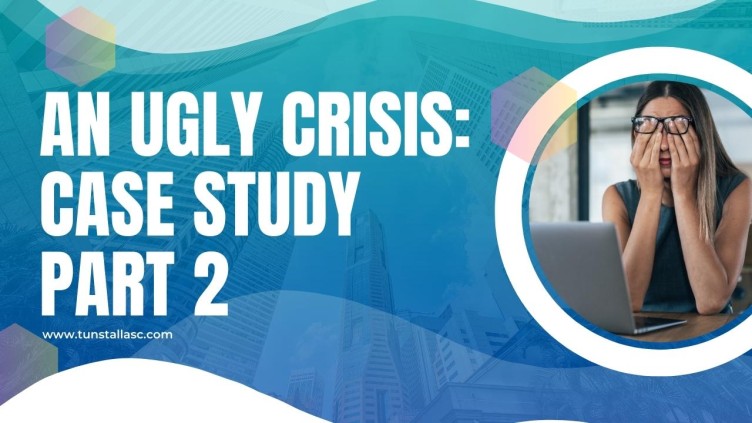Deepwater Horizon
A CEO who buckles under a crisis takes the whole company along for the ride. An unfortunate example of getting the tone and approach wrong comes from the BP Deepwater Horizon oil spill and crisis.
On April 20, 2010, the oil drilling rig Deepwater Horizon, operating in the Macondo Prospect in the Gulf of Mexico, exploded and sank resulting in the death of 11 workers on the Deepwater Horizon and the largest spill of oil in the history of marine oil drilling operations. (USEPA)
For 87 days after the explosion, the well blasted oil and natural gas continuously and uncontrollably into the northern Gulf of Mexico.

An impossible to case to manage well? Or a poorly advised and weak communicator
As an individual, BP CEO Tony Hayward was a technical specialist, a long time BP employee and a very knowledgeable industry insider. As a crisis communicator, he massively underperformed.
He had been reportedly appointed as a contrast to his predecessor, a larger than life character, Lord John Browne, who had been removed after multiple fatalities in three accidents in North America in earlier years. Note to risk managers : Surely these must have been strong leading risk indicators that all was not well at BP US operations.
For all his flaws, and there were arguably many, Browne was a showman and a polished orator. Hayward was clearly not, as he demonstrated when the Deepwater Horizon crisis hit. Some people are just not born to project well in these situations. Hayward ‘suffered’ from a rather posh British manner which in the Southern US states came across as arrogant or even contemptuous.
His apparent lack of preparation (or the misinformation provided by his team) combined with an apparent inability to articulate an effective corporate response as the crisis deepened. This became a feast for the US media, out for blood, and someone to blame.

The spill happened on April 20 so Hayward had plenty of time to be properly briefed and prepared. However, here is a selection of the worst reported errors. There were many others.
April 29, “What the hell did we do to deserve this?” In comments to fellow BP executives. As the investigation showed, they had done a lot wrong.
May 13, Hayward in interview with the Guardian UK ; the oil spill was “relatively tiny” and “ The Gulf of Mexico is a very big ocean. The amount of volume of oil and dispersant we are putting into it is tiny in relation to the total water volume.”
1.4 million barrels of crude had been lost at that time or thereabouts; it was already worse than Exxon Valdez.
May 18, Hayward on Sky News; the environmental impact of the spill “will be very, very modest.”
May 30, “I would like my life back,” referring to the way the spill had taken over his time.
This is also on video (see the CBS link below) This was clearly still the time he was supposed to be apologizing for the spill, and not complaining about the effect on his personal life.
Perhaps not surprisingly he received no sympathy from the thousands of Americans whose livelihood had been affected. Particularly as shortly after that he took a day off to go sailing in the Solent in England, again captured by the media and broadcast in a manner to make Hayward appear aloof and elitist.
May 31, “The oil is on the surface,” he said. “There aren’t any plumes.”.
One of the best video summaries that showed how badly managed the PR angles were, is this one. Worth two minutes to watch:
BP’s PR Offensive: CBS News: https://www.youtube.com/watch?v=L10W8tgpPwc
The BP social media campaign was equally disastrous as spelled out in Wired :
https://www.wired.com/2010/06/bps-social-media-campaign-going-about-as-well-as-capping-that-well/
June 17 The Congressional Interviews :
BP’s chief executive Tony Hayward is grilled by a congressional committee. Here is a selection of his responses:
“I can’t possibly know why the decisions were made [on the rig]; I don’t know; I can’t answer the question in that form. I can’t recall the number; I can’t answer because I wasn’t there; I’m afraid I can’t recall; I can’t recall that either; That was a decision I was not party to; I don’t know; I’m afraid I don’t know that either.”

BP announced on 27 July 2010 that Hayward would be replaced by Bob Dudley as the company’s chief executive effective as of 1 October 2010
As a consequence of his overall performance, Hayward will largely be remembered as fumbling the response to the worst environmental disaster in U.S. history. However, his personal star was largely unaffected. After his removal from the position at BP, he secured high-profile appointments at Glencore and Genel Energy.
In July 2013 his award of an honorary degree from Robert Gordon University was described as “a very serious error of judgment” by Friends of the Earth Scotland.
Next time we will consider in more detail how to use social media more effectively to protect and manage reputation. And just as importantly, when to stay silent.


